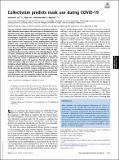Collectivism predicts mask use during COVID-19
Author(s)
Lu, Jackson G.; Jin, Peter; English, Alexander S.
Downloade2021793118.full.pdf (751.3Kb)
Publisher Policy
Publisher Policy
Article is made available in accordance with the publisher's policy and may be subject to US copyright law. Please refer to the publisher's site for terms of use.
Terms of use
Metadata
Show full item recordAbstract
Since its outbreak, COVID-19 has impacted world regions differentially. Whereas some regions still record tens of thousands of new infections daily, other regions have contained the virus. What explains these striking regional differences? We advance a cultural psychological perspective on mask usage, a precautionary measure vital for curbing the pandemic. Four large-scale studies provide evidence that collectivism (versus individualism) positively predicts mask usage—both within the United States and across the world. Analyzing a dataset of all 3,141 counties of the 50 US states (based on 248,941 individuals), Study 1a revealed that mask usage was higher in more collectivistic US states. Study 1b replicated this finding in another dataset of 16,737 individuals in the 50 US states. Analyzing a dataset of 367,109 individuals in 29 countries, Study 2 revealed that mask usage was higher in more collectivistic countries. Study 3 replicated this finding in a dataset of 277,219 Facebook users in 67 countries. The link between collectivism and mask usage was robust to a host of control variables, including cultural tightness–looseness, political affiliation, demographics, population density, socioeconomic indicators, universal health coverage, government response stringency, and time. Our research suggests that culture fundamentally shapes how people respond to crises like the COVID-19 pandemic. Understanding cultural differences not only provides insight into the current pandemic, but also helps the world prepare for future crises.
Date issued
2021-05Department
Sloan School of ManagementJournal
Proceedings of the National Academy of Sciences
Publisher
National Academy of Sciences
Citation
Lu, Jackson G. et al. "Collectivism predicts mask use during COVID-19." Proceedings of the National Academy of Sciences 118, 23 (March 2021): e2021793118.
Version: Final published version
ISSN
0027-8424
1091-6490